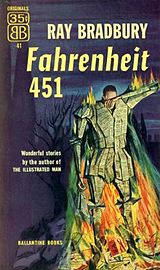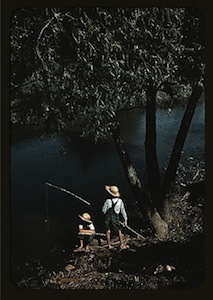Every event needs it’s own song, so here’s the soundtrack for National Novel Writing Month, aka NaNoWriMo. Vocals, Electric Guitars, Bass, Irish Bouzouki, Glockenspiel, Organ, Drum Programming– it’s all by John Anealio, specialist in geeky anthems, for NaNoWriMo 2011.
The Publishing Process as Seen in GIF by Nathan Bransford
 Writers sometimes sound lofty themes of Purpose and Art in talking about the writing and publishing process. And then there’s Nathan Bransford. A former literary agent turned author (Jacob Wonderbar and the Cosmic Space Kapow and other erudite titles), Bransford uses a series of animated GIFs to tell it like it is.
Writers sometimes sound lofty themes of Purpose and Art in talking about the writing and publishing process. And then there’s Nathan Bransford. A former literary agent turned author (Jacob Wonderbar and the Cosmic Space Kapow and other erudite titles), Bransford uses a series of animated GIFs to tell it like it is.
Even if you usually avoid flickering, flashing, animated anything online, The Publishing Process in GIF Form is funny. And it’s probably a lot more true than the lofty, artsy version. Enjoy!
P.S. The take-away from his overview seems to be that patience is the quality most needed to survive the life of an author. Which, if you think about it, is probably one reason our instant-gratification culture is increasingly turning to alternative publishing. That, and a desire (for better or for worse) for increased creative control of intellectual property.
How to Kill Your Book: An Anti-Marketing Guide

Want to make sure your book languishes in obscurity? Or if it’s already popular, that it fades quickly away? If you’d like to ensure that your writing remains (or becomes) unreviewed, unshared, and unseen, these tips are for you.
1: Be very secretive about your unpublished manuscript. When you query agents or editors, let them know you hold the copyright to your work. Be sure not to give away details such as the complete title, character names, or plot outline of your work in the query. Assure them that your manuscript is very funny and certain to be a bestseller, as your mother, your dentist, and two of your children couldn’t stop laughing when you read a paragraph aloud. Emphasize the fact that no eyes but yours have ever seen the entire manuscript because it’s the original work of a highly creative genius whose voice must be preserved at all costs.
2: Don’t allow an editor to change a thing. After all, ain’t is in the dictionary and there’s no good reason not to use an apostrophe to indicate a possessive. Plus, longer is better. If Gone With the Wind sold over a million copies the first year with only 1037 pages, your 3789-page epic should at least double those sales.
3: Invoke your copyright at every opportunity. If a fan recommends your book, comments on its plot or characters, or even mentions the complete title in an article, blog, or social media post, be sure to respond with the news that your work is under copyright protection. If they quote a line or two, even in a complimentary context, threaten to notify your intellectual property attorney and possibly file a lawsuit.
4: Defend your work vigorously. If someone makes a neutral or negative comment about your work in a review, blog post, bookstore site comment, or social media outlet, be sure to launch a vitriolic attack on them so that readers will understand what idiots they are for not adequately appreciating your masterpiece. Teach them not to disrespect your work by posting rude comments on their blog and social media streams.
5: For children’s literature, require that teachers and librarians get signed permission from you to share your book during story hour. You might also make them sign an agreement that they won’t share the last page, as you want to leave readers hanging so they’ll run out to buy your book. Make sure teachers, fans, or librarians don’t recommend your book or share a story-hour-reading online– you wouldn’t want to accidentally reach new fans who might keep the book alive.
6: Be one of “those” authors. Carry your book everywhere with the title facing out. Always mention that you’re an author and you just happen to have a copy on hand and you’d be happy to take cash, check, debit, or credit. If the customers in line behind you seem impatient, just give them an evil stare and let them know you are an AUTHOR. If you get the opportunity to do a book signing, be sure the bookstore meets your publicity demands and refuse to sign any extra books for future sales. Be rude to people who look at your book but don’t buy it.
7: Choose your heirs carefully. If you’re getting older, be sure to leave your work to a family member who knows nothing about publishing or marketing, but who will protect your copyright at all costs. Make sure they don’t allow your book to be reprinted or e-published, as you want the first editions to hold their value. Leave your heirs this list of helpful tips so they can ensure that your work dies with you.
If you have other helpful tips, please feel free to share them. Many authors have already doomed their work by acting on these time-tested ideas, so fresh, creative ways of killing a book would doubtless be welcome.
Note: Image courtesy of © Vladacanon | Dreamstime Stock Photos & Stock Free Images
Originally published May 14, 2012; updated 2/2017.
Writing Advice from Ray Bradbury
Author Ray Bradbury has done it all– novels, non-fiction, short stories, and more. In “Telling the Truth,” the 2001 keynote address at Point Loma Nazarene University’s Sixth Annual Writer’s Symposium by the Sea, he shares frank, practical writing advice. He’s laugh-out-loud funny, occasionally profane, but his advice is profound and well worth absorbing.
Here is a quick outline of a few primary points. Don’t miss his talk, though. It’s peppered with wonderful anecdotes, interesting people, good humor, and vivid language.
- Write short stories, not novels, first.
- You may love another author, but you can’t be them.
- Study high-quality short stories by classic authors (he provides specific recommendations).
- Stuff your head with good stuff.
- Fire the friends who don’t support you.
- Live in the library, not in front of a screen. He “graduated from the library.”
- Fall in love with old movies.
- Do what you do with love, and write with joy. If writing starts feeling like work, scrap it and start something else.
- Don’t focus on making money, but on writing. The story of his trip to New York City and the sale of his first two books is inspiring.
- You can deal with the ten things you love, hate, fear, or almost remember by writing them into stories.
- Surprise yourself. Type what comes into your head–intuition and word association can spark many ideas. You don’t know what is in you until you test it. Bradbury said his first film wasn’t good, but it was a beginning.
- You write for readers. What you’re writing for, even if you don’t know it, is for at least one person to love what you do. And you must love it too.
I love his opinionated commentary about short story writers, perhaps because he shares my taste for classic authors, metaphors, and stories that go somewhere.

My favorite tip is to “stuff your head with good stuff.” He suggests that if you read one short story, one good, classic poem, and one essay before bedtime for the next one thousand nights, you’ll have a wealth of material to work with. I’ve been teaching for years that “input must come before output,” and Bradbury offers concrete examples of how to make it happen.
Bradbury’s joy in reading and writing are contagious, and mental snapshots of dandelions, King Kong, Bill Gates (“I don’t do Windows”), an enthusiastic barber, a destroyed face, and Gene Kelly are vivid reminders of his gift. This video is part of the University of California Television (UCTV) series.
Libraries raised me. I don’t believe in colleges and universities. I believe in libraries . . . I went to the library three days a week for 10 years. (Ray Bradbury)
SOPA and PIPA: Should Writers Oppose Them?
If you’ve been bouncing around online today, you’ve probably noticed a number of “Stop SOPA” labels and posts about SOPA and PIPA. If you haven’t noticed, perhaps you’ve been working (good plan). I’m working too, but since the internet is a huge part of my business, I’m paying attention to things like SOPA and PIPA, because I care about keeping my business alive.
I’ve already written about SOPA and PIPA on my entrepreneurship blog, Do What Matters, Make it Pay, so I won’t cover everything here, but I will share a link to the American Censorship infographic and a compelling Ted video by Clay Shirky that explains how SOPA and PIPA assume “guilty until proven innocent” and have the potential to turn the internet into a censored wasteland.
Remember, visit Do What Matters to find links to more information, a petition, and other videos.
You Need a Business Website–Really
 No matter what kind of writer or editor you are, or what kind of business you’re in, you need a business website. And no matter what your budget or skill level, you can create a simple business website. Even if you’re in a very traditional market niche, potential clients like having the ability to look online to learn more about you.
No matter what kind of writer or editor you are, or what kind of business you’re in, you need a business website. And no matter what your budget or skill level, you can create a simple business website. Even if you’re in a very traditional market niche, potential clients like having the ability to look online to learn more about you.
The easiest kind of site to put up is a blog-based site that you can edit with the ease of writing an e-mail. If you’re a member of NAIWE, you already have this kind of site– it’s what I’m writing on now. The NAIWE sites all feature the same professional design with an internet address (URL) of yourname.naiwe.com. They serve not only as a business website, but also as evidence that you belong to a relevant professional association.
There are other simple blog-based sites available, some of them totally free. These include Blogger.com, WordPress.com. Weebly.com and others. These allow you the same point and click ease of the NAIWE sites, but most have long URLs such as yourblogname.blogspot.com, which is dead giveaway that you’re using a free public space for your site.
Having a free web address isn’t entirely professional, but if it’s all you can do at the moment, at least purchase your business name as a URL and forward it to your free blog (you can do this with your NAIWE blog as well). You can read about how to purchase your domain at my Do What Matters, Make it Pay blog. When you’ve purchased the domain name, just go into GoDaddy’s Domain Manager (if that’s where you purchased the domain) and click on “Forwarding.” Fill in the address of the page you want your domain name to open; click “Save,” and you’re done.
Now www.BusinessName.com will point directly to your free website, and it will be the only address you’ll need to put on your business cards. That way, when you’re able to move into a new site on your own domain, you won’t have to change cards, and you can just stop the forwarding by canceling it your domain manager.
After you move to your own domain, use the old free domain as a pointer site to your primary site. Copy excerpts from each of your new blog posts with “Read more . . . ” links attached so that your old free blog site can continue driving traffic to your new site.
If you want to be an entrepreneur, it helps to have the basics in place. Enjoy!
How to Find What You’re Meant to Do
Bored? Just Edit a Classic and See What Happens
 If you’re bored, craving attention, or just want to stir up a little trouble, try releasing a new edition of a classic. Preferably, make it something well-known and beloved, like Mark Twain’s Huckleberry Finn.
If you’re bored, craving attention, or just want to stir up a little trouble, try releasing a new edition of a classic. Preferably, make it something well-known and beloved, like Mark Twain’s Huckleberry Finn.
I’m sure that Twain scholar Alan Gribben expected a bit of controversy when he edited a new edition of Huck Finn that replaces the “n-word” with “slave,” and “Injun” with “Indian,” but even he may have been surprised by the outpouring of outrage.
I was first alerted to the controversy by shrieks of “censorship!” on Twitter. It was refreshing to see “#huckfinn” as a trending topic, possibly displacing a teeny-pop star or imploding politician. However, I had to mildly quibble with the use of the word “censorship” (see “Deciding How Peeved to Be Over New Huck Finn Edition“).
I’ve been following the discussion from various sources. One of the best articles I’ve read is by Miami Herald columnist Leonard Pitts, who provides several compelling reasons why it’s wrong to alter art in “Don’t Censor Mark Twain’s N-Word.” The article was accompanied in our local paper by an outstanding editorial cartoon by Pat Oliphant, one of my favorite graphic commentators.
Other good articles have been showing up, including a few from NAIWE writers. You might also enjoy these additional posts and editorial cartoons:
Literature professor Scott Andrews addresses the issue in two thoughtful posts, Goodbye, cruel word and The Other N-Word.
“Tom the Dancing Bug: Adventures of Huckleberry Finn (Corrected to reflect modern sensibilities)” offers an amusing look at what a truly sensitive version of Huck would sound like. Oddly (or perhaps not so), it sounds like a publication of the NEA.
In “Twain Redone,“ Brenda Seward talks about her reactions to Twain’s writing when she read it in elementary school (can you imagine elementary school students being expected to read either Finn or Sawyer now?), and shares her viewpoint on the change.
Linda Anger, NAIWE member and owner of The Write Concept, Inc., offers another perspective in “Altering the Classics.”
From NJ.com, an article discussing whether Twain might have expected controversy over his use of certain word, accompanied by three amusing editorial cartoons.
Mike Luckovich‘s cartoon on Mark Twain
If you’ve read an interesting article on the subject, or posted something, please feel free to post a comment below and share it. Altering the classics is nothing new, but it’s something that can easily get out of hand. People with good intentions bear watching!
Time to “Do the Next Thing”- My New Year’s Resolution
I’m not inclined to get too detailed with my New Year’s Resolutions, and this year is no exception. Four words is all it takes to sum up my intent for 2011. Here’s what it’s all about:
Do this. Don’t do that. Be this. Don’t be that…
New Year’s resolutions sometimes sound like the barking of a Marine sergeant dealing with raw recruits on a sub-zero morning. Personally, I’m a fan of warm covers on sub-zero mornings, and I tend to ignore barking of any kind (just ask my terrier). But I still like to go through the process of thinking back over the previous year, considering what went well and didn’t, and focusing on what I’d like to make happen in the new year.
I’ve discovered that simple is usually better when it comes to resolutions, so I try to boil down what I want to accomplish into one sentence. This year…. Read more….
What’s the Best Way to Start Writing?
 I don’t know about the best way for everyone, but for me, I know that it’s the magic of the first line that makes it happen. There are things that must happen before the first line arrives, and that’s sometimes the tricky part.
I don’t know about the best way for everyone, but for me, I know that it’s the magic of the first line that makes it happen. There are things that must happen before the first line arrives, and that’s sometimes the tricky part.
Here’s a bit about my writing process– The Magic of the First Line. After you read about it, I’d like to hear about the method that works best for you. Feel free to post on your own blog and link back in the comment section so that others can read your ideas as well.
The only thing certain about writing processes is that there’s not a single right way that works for everyone, but reading about the way that others do it can be an inspiration. So… read along, and share your thoughts!
- « Previous Page
- 1
- 2
- 3
- 4
- …
- 10
- Next Page »

